PEN eNews 6(5) February 2017
PEN
® eNews is a monthly e-newsletter shared with the global PEN Community and created to help dietitians position themselves as leaders in evidence-based nutrition practice. In addition, users of the PEN System will find articles on the new evidence, resources and features available and how to maximize one's use of PEN.

Showcasing dietitians’ expertise and thought-leadership, one post at a time
Each weekday, the PEN® Team shares information with our social media followers which we think will help support your dietetic practice. We carefully select content that we think would be helpful and timely to dietitians, and would help you showcase yourself as an evidence-based leader in food and nutrition practice within your own personal networks and practice setting.
Timely sharing of information is determined based on our daily scanning of journals, media, trending topics, the questions dietitians are asking the PEN® Team, and by looking ahead into health and nutrition advocacy days in the coming weeks. Of course, we track what content does resonate with our dietitians network, through the use of various website metrics.
At the end of December 2016, we had 9735 followers on Facebook. As part of being on the high-achieving PEN® Team, with motivated, hard-working and goal-setting dietitians, I had set a goal that by the end of March 31, 2017, we would hit 10,000 likes on Facebook. A respectable, SMART goal.
To my surprise (and delight), we achieved this goal the first week of January!! The PEN® System reached 10,000 Facebook likes! When I went through what was responsible for the 493 additional page likes *in one week*, it was this post:
 “Being asked about cleanses? Your intestines, liver and kidneys effectively remove waste from your body every day.
“Being asked about cleanses? Your intestines, liver and kidneys effectively remove waste from your body every day.
This post had 445 likes, 335 shares and reached 76,500 people! These metrics indicate that we had selected content that was timely for dietitians and helped to showcase dietitians as food and nutrition experts. In a sea of food and nutrition information, the PEN® System can help you weather food and nutrition “storms” by providing you with access to practice-guidance and client education tools to help calm the waters.
Thank you for being a part of our PEN® Community on Facebook (and if you aren’t a part of it, come join us!). Here’s a virtual toast to more conversations with dietitians around the world, on the breadth of dietetic practice, helping to share our expertise, one post at a time.
In this issue of PEN eNews 6(5), we share the following articles:
- How the PEN® System’s family of evidence reviews keeps the dietitian current and ready for emerging practice issues and controversies
- What do dietitians find is the most challenging aspect of helping people with weight management? Responses from the trenches of dietetic practice
- Dietitians Association of Australia hold webinar to enhance the use of PEN® in the Australian university setting
- How do I…use knowledge pathways?
- PEN® Team’s Surprising Findings of 2016 is the most clicked-on content this fiscal year!
- PEN® Website achieves international certification for its 3rd straight year!
- Thank you to our International Review Panels and Working Groups
- Announcements from the PEN® Community
- And more!
Enjoy PEN® eNews 6(5)!
Kristyn Hall MSc, RD
Editor, PEN® eNews
PEN® eNews may contain links to other external websites. PENnutrition.com is not responsible for the privacy practices or the content of such external websites. Neither Dietitians of Canada, nor any dietetic associations contributing to or licensing the content in Practice-based Evidence in Nutrition: PEN® endorse the content, products or services on other websites.
What's New in PEN®
Below is a quick glance at some of our new and updated content. Look for the new

and updated

symbols in PEN
® System to see more new and enhanced content!
Updated Knowledge Pathways
Updated Practice Questions
Professional Tools
New Practice Questions
Client Tools
Trending Topics
How Do I … Use knowledge pathways
This article was originally printed in Dietetics Today, a publication of the British Dietetic Association in May, 2016. It is reprinted here with permission. Note: watch for our video tutorial of the PEN Knowledge Pathway in the coming weeks: PEN Tours and Videos Tutorials.
In this article, we demonstrate how PEN can help you in your clinical practice.
All topics in PEN are collated under a Knowledge Pathway (see Diagram 1). In this article, we have provided the coeliac disease Knowledge Pathway as an example. The layout for all Knowledge Pathways in PEN are exactly the same.
Diagram 1: This is your Knowledge Pathways, similar to an online version of chapters in a text book.
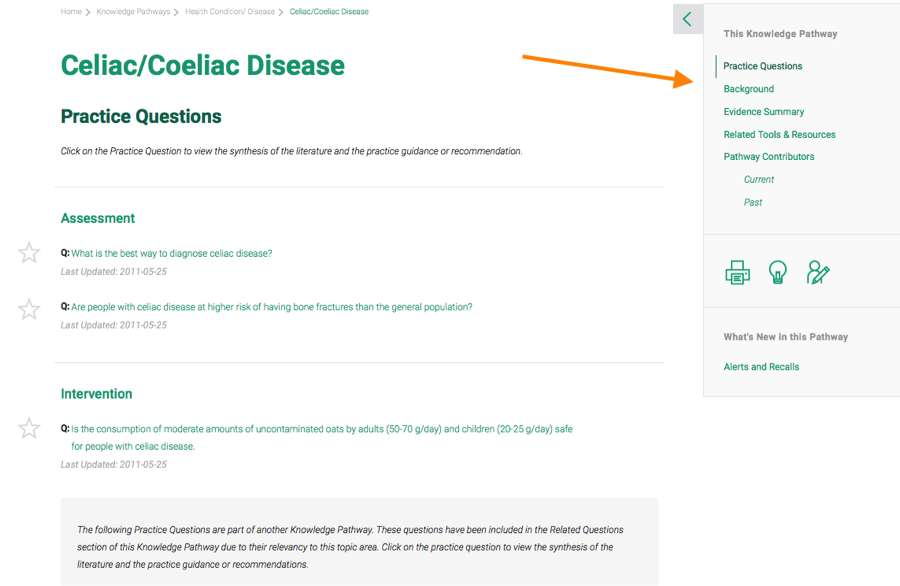
The first question to ask yourself is, “What information do I need to know about coeliac disease?” The examples below should hopefully cover some of these…
‘‘I have a specific question about coeliac disease’’
The first page in the coeliac disease Knowledge Pathway consists of the Practice Questions. These are questions dietitians have previously posed relating to a very specific area of coeliac disease. For example: “What is the best way to diagnose coeliac disease?” and “Are people with coeliac disease at higher risk of having bone fractures than the general population?”
‘‘I would like a general overview about coeliac disease. Where can I look for things like symptoms, screening, prevalence and nutritional management?’’
Have a look at the right-hand side of the coeliac disease Knowledge Pathway. The Background section will provide you with a general, yet detailed overview of coeliac disease. This is a great place to start if coeliac disease is an unfamiliar area of dietetics to you or you just want a refresher. If you’re limited for time, check out the Practice Guidance Summary/Toolkit instead. This provides you with a brief overview of the whole coeliac disease Knowledge Pathway.
‘’Where can I find a succinct overview of the key evidence relating to coeliac disease?’’
Take a look at the right-hand side of the coeliac disease Knowledge Pathway. The Evidence Summary section will provide you with short summary of the key evidence points relating to coeliac disease. From a time perspective, this is a great way to obtain an accurate, succinct and evidence-based overview in a timely way.
‘‘I would like to be able to locate key reports/policy statements/guidance about coeliac disease (for example, NICE guidelines)’’
Look no further than Related Tools and Resources. This section allows to you to download, read and print off a wealth of key UK documents. For example, in the coeliac disease Knowledge Pathway you can find:
- Coeliac Disease NICE Guidelines (2015)
- British Society of Gastroenterology Guidelines on the Diagnosis and Management of Adult Coeliac Disease (2014)
- BDA Policy Statement: Gluten Free Food on Prescription
“I would like to be able to provide my patients with handouts, leaflets and information to take away with them’’
Go to the section Related Tools and Resources. This section allows to you to download and print off a wealth of tools and resources for your patients with coeliac disease.
Make PEN your first choice evidence-based tool during your dietetic career, providing you with quick and easy access to reliable information on over 190 dietetic and nutrition-related topics.
Written by:
Sammie Gill BSc (Hons), R.SEN, RD, PhD
Policy Officer (Evidence-based Practice)
British Dietetic Association
globalpen@bda.uk.com
How the PEN® System’s family of evidence reviews keep the dietitian current and ready for emerging practice issues and controversies
Systematic, rapid, scoping, realist – these are different kinds of literature review methodologies. Did you know – the PEN® System uses different kinds of evidence review methodologies, depending on the purpose of the review? Read on to see how the PEN® System’s family of evidence reviews helps keep dietitians current and practice-ready with systematic, transparent and unbiased practice guidance.
We came across an editorial recently written by David Moher, Lesley Stewart and Paul Shekelle entitled All in the family: systematic reviews, rapid reviews, scoping review, realist reviews and more.
Moher and his colleagues walk us through the evolution from narrative reviews, which summarize and interpret primary studies based on the author’s expertise and/or experience, to systematic reviews in which the methods for searching for and appraising the literature are formalized and explicit, to rapid reviews that have emerged to meet the need for a quick summary of the evidence, to scoping reviews that provide an overview of the state of the science. While there are pros and cons to the different types of reviews, Moher et al. argue that they may all have a place in our evidence libraries if they are rooted “in the scientific method, with their methods articulated in advance in sufficient detail that the review can be reproduced by others.” (1)
This article inspired us to think about all the different approaches we use to review and translate the scientific literature. They too have evolved over time, sometimes in response to evolving methodologies for critically appraising the literature, and sometimes to respond to our users’ need for quick assessments of single primary studies that might be making the news.
The PEN® System has three main approaches to creating its practice guidance:
The PEN® Evidence Synthesis and Recommendations are in-depth, internationally applicable appraisals of the evidence with practice advice.
Quick Reviews of existing PEN® recommendations help to ensure timely practice guidance.
Article Analyses and Evidence Clips are short and timely assessments of trending topics in the media.
1. PEN® In-depth Evidence Synthesis and Recommendations
The PEN® team uses both the PEN® evidence-based process and the PEN® GRADE approach to provide graded, evidence-based “answers” to practice questions either identified by our PEN® topic authors or submitted by PEN® users. These comprehensive and systematic evidence syntheses also consider country-specific guidelines and governmental policy directives in creating the practice recommendations.
The approach taken with our PEN® evidence synthesis and recommendations depends on the type of question being asked.
-
The PEN evidence-based process answers questions primarily about diagnostic accuracy or prognosis, e.g. What screening process can be used to identify adults at risk of malnutrition?
- PEN® GRADE process answers questions primarily about impact of interventions, e.g. Does nutrition support improve health outcomes?
Once the question has been identified, the process for PEN® evidence synthesis and review consists of:
-
Developing a search strategy and searching the literature using a hierarchical approach to filter the evidence (e.g. first identify high quality systematic reviews or guidelines based on systematic reviews).
-
Summarizing the evidence
- For PEN® evidence-based process, we summarize the results of reviews, studies and guidelines
- For PEN® GRADE, evidence is summarized for each client-important outcome (e.g. disease exacerbation, hospitalization or quality of life)
-
Assessing the quality of evidence
- For PEN® evidence-based process, we assess the evidence across all studies or guidelines and grade it as: A, B, C or D
- For PEN® GRADE, evidence is assessed for each outcome across studies and across all outcomes, and is graded as: high, medium, low or very low
-
Providing a recommendation
- For PEN® evidence-based process, we provide practice guidance recommendations
- For PEN® GRADE, we consider the evidence along with patient values and costs, and provide a recommendation rated as: strong or conditional
All PEN® content undergoes peer review. Peer reviewers may be academics or practitioners with acknowledged expertise, experience or training in the topic area. The goal is to have someone from each partner country (three individuals representing Australia, Canada and the United Kingdom), serve as reviewers. Reviewers’ guidelines are provided to all peer reviewers to ensure a comprehensive and transparent review process. For PEN® GRADE, there is an opportunity for a more intensive role on an international review panel serving as a resource person to the author through the entire process of developing PEN® content; these individuals are identified as co-authors.
2. PEN® Quick Review
As the PEN® database grows in depth and breadth, one of the tools we use to help set priorities for updating the practice questions in the PEN® System is the Quick Review process. This allows us to assess the evidence that has been published since the PEN pathway was written or last updated. Authors of Quick Reviews follow a defined process and document the following:
-
Date search conducted, databases searched, search terms, concepts, and limits used in the scanning process. They search for evidence-based guidelines, systematic reviews and meta-analyses before identifying individual studies, as the individual studies may already be included in recent reviews and analyses.
-
For each practice question, the number, type and strength of the articles are identified (refer to the Evidence Grading Checklist).
- An overall evaluation is made of the existing PEN®content relative to the new literature found to identify priorities for synthesizing content, filling gaps and generating new content.
-
An assessment is made using the Quick Review Checklist to determine if the update will be minor, moderate or major.
Once the Quick Review is completed it is decided who will do the update to incorporate the new evidence – e.g. if it is a minor update it is assigned to one of our PEN® team members to do as soon as possible; if it is moderate or major work then it will be assigned either to one of our PEN® Evidence Analysts (experienced authors on the PEN® team) and added to their list of topics or to an external author with expertise in the topic area.
3. PEN® Article or Topic Analysis
Sometimes a single research study or a Cochrane systematic review will make news headlines. To provide a timely assessment of the quality and impact of such a study, a member of the PEN® team will prepare an Article Analysis. These are generally one page in length and focus on the quality of the study, how this information fits with what is already known, as well as implications for dietetic practice. These are peer-reviewed either internally by a PEN® Evidence Analyst or an external content expert and posted quickly so dietitians have access to the analysis in time to respond to the headlines!
Sometimes a number studies or a systematic review will be published on a topic trending in the media or scientific literature. It is vital for dietitians to know more about these issues and share the analysis with their interdisciplinary colleagues and members within their inter-professional health care team and advocacy networks. In this case a larger, in-depth Evidence Clip will be written by a PEN® Evidence Analyst or an external content expert. These “shortish” analyses are also peer reviewed and are linked to a relevant knowledge pathway in the PEN® System.
The outline for both an Article Analysis or Evidence Clip is similar:
-
overview – study title or topic of the review;
-
evidence analysis;
-
the bottom line or practice recommendation; and
-
links to any additional content in PEN and ending with a list of contributors.
Sample Article Analyses can be found in Trending Topics on the PEN home page.
Summary
Our PEN® family of evidence reviews consists of different approaches depending on the purpose of the review.
- Our PEN® Evidence Synthesis and Recommendations use the PEN® evidence-based process and the PEN® GRADE approach to produce in depth and internationally applicable appraisal of the evidence and practice advice; e.g.: saturated fats and CVD – given the breadth of recent literature, this requires a comprehensive update and development of new content.
-
Quick Reviews of existing PEN recommendations ensure the information is still applicable to practice; e.g. Interstitial Cystitis – dietitians need timely practice guidance – in this case, a quick review methodology is appropriate.
-
Article Analyses and Evidence Clips provide shorter and timely assessments of an article or topic that is trending in the media.
The PEN® System’s family of evidence reviews are all important and developed using a rigourous, transparent and unbiased approach to create practice guidance that dietitians can trust.
Our family of evidence reviews and recommendations keep the dietitian current and practice ready, and will continue to evolve over time. We welcome feedback from our PEN® users on any element of the PEN® System. If you would like to be a PEN® Contributor, there are many tools and resources within the PEN® System to assist authors and reviewers under our PEN Authors and Reviewers Resources and remember, our ‘Submit a Content Idea’ or Become a PEN Author or Reviewer is always open!
| Process |
PEN® Evidence Synthesis and Recommendations |
PEN® Quick Review |
PEN® Article or Topic Analysis |
| Search
|
Develop search strategy using Search Strategy Worksheet |
Develop search strategy using Search Strategy Worksheet |
Not generally done for an article analysis; reporting on topic trending in the media.
An Evidence Clip that provides more topic analysis tends to be based on an article described in the news followed by a quick search for a related systematic review or meta analysis on the topic. |
| Analysis |
Evidence-based process or GRADE process to answer practice question |
Update existing practice question as needed using evidence-based process |
Critical analysis of a single study or review of a topic |
| Depth or Compre-hensiveness
|
In-depth update or development of practice question
|
Generally minor update of practice question
|
In-depth analysis of one study or topic
|
| Length |
Varies based on content |
Varies based on content |
Usually short (1-2 pages) |
Written by members of the PEN® Team:
Jayne Thirsk PhD, FDC, RD, Director, PEN®
Dawna Royall, MSc, RD
Beth Armour MEd, PDt
Jane Bellman, MEd, RD.
References
1. Moher D, Stewart L, Shekelle P. All in the Family: systematic reviews, rapid reviews, scoping reviews, realist reviews, and more. Syst Rev. 2015 Dec 22;4:183. Citation available from: https://www.ncbi.nlm.nih.gov/pubmed/26693720
What do dietitians find is the most challenging aspect of helping people with weight management? Responses from the trenches of dietetic practice
Weight management is a popular topic, especially in January, when it is common to set New 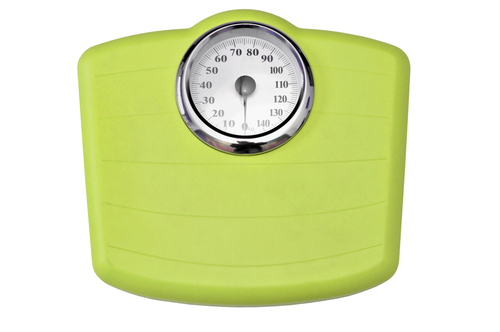 Year’s Resolutions. We asked our PEN® followers on Twitter – What do Dietitians find is the most challenging aspect of helping people with weight management?
Year’s Resolutions. We asked our PEN® followers on Twitter – What do Dietitians find is the most challenging aspect of helping people with weight management?
Here is what we heard:
- a food environment that forces the opposite. Alex Munt @alexandramunt91
- the festive period! Dr Enzo Di Battista @EnzoRD_PhD
- preventing weight gain and saying how much that is an achievement with mental health problems. Fiona G @feegee5
- clients usually interested in quick weight loss diets instead of life long healthy eating habits. Anar Jamal @Anar5Jamal
- lowering expectations to something reasonable (1 pound per week rather than 5). Amy Jones @GlutenFreeRDAmy
- dispelling long held weight loss myths/ faddy diets. Claire Irlam RD2b @claireirlamrd2b
- encouraging self-compassion. Clients can be very critical of their behaviours/bodies which hinders sustainable change. Tom - Reconnect Nutr @Scully_tom
- convincing them to let go of weight and focus on health. Jess Bailes @JeeBailesAPD
- educating people regarding a healthy lifestyle changes than a quick fix diet fads. Rachael Eller RDN @eatrightGI
Environment, weight management goals and expectations, myths vs reality of weight management, and healthy lifestyles are all areas addressed in our Healthy Weights/Obesity Toolkit and Healthy Weights/Obesity Knowledge Pathway.
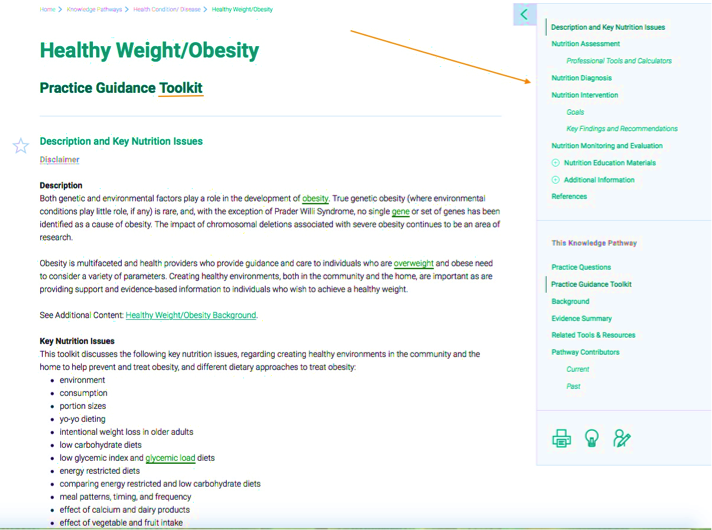
Dietitians Association of Australia holds webinar to enhance the use of the PEN® system in the Australian university setting
PEN® Site Licenses are a valuable resource for universities providing dietetic programs. More than 80 per cent of Australian and New Zealand universities with an accredited dietetics program now have a PEN® site license which provides their students, our future dietitians, with the opportunity to learn about the PEN® System and also use it to support their studies. PEN can be used in the university setting as an evidenced-based resource for students, as an opportunity for research projects and much more.
In December 2016, the Dietitians Association of Australia (DAA) ran a webinar for dietitians working in the university  setting, providing them with valuable information on how to use PEN within the university curriculum – thereby helping them to get the most out of their PEN® access.
setting, providing them with valuable information on how to use PEN within the university curriculum – thereby helping them to get the most out of their PEN® access.
Associate Professor Judy Bauer presented the webinar which covered general background information on the PEN® System, its key features, training modules, the international collaborations taking place to create knowledge, and ways to embed the PEN® system in the university setting. One of the highlights of the webinar was showcasing the current ways universities are using PEN within the curriculum. Examples included:
-
Embedding PEN® resources for nutrition education and counselling sessions within courses
-
Students conducting systematic literature reviews and submitting to PEN
-
PhD students translating their research by updating or writing new PEN® content
-
Students using PEN® content to write a nutrition blog.
The webinar was a great way to highlight how beneficial the PEN® System is in the university setting and to learn from a number of Australian universities practical ways to use it within the curriculum. For DAA members the webinar is available on DINER.
DAA will continue running professional development opportunities for its members to promote the PEN® System and to ensure our members get the most out of this valuable resource. Two workshops are scheduled for the 2017 DAA National Conference in Hobart - one on PEN® Basics and the other on the GRADE system PEN is now using. Registrations for the 2017 DAA Conference are open now.
Please contact Natalie Stapleton, at DAA with any questions.
For more information on how universities in Australia, Canada and the United Kingdom are using PEN read: Five Learnings from Introducing an Evidence-based Tool to Dietitians and Nutritionists of the Future.
Written by:
Natalie Stapleton, APD, AEP
PEN® Team’s Surprising Findings of 2016 is the most clicked-on content this fiscal year!
Each day, our Global PEN® team reviews the literature for evolving research and monitors  for nutrition trends. Since 2012, the PEN® Team has reflected and shared its surprises of the year through our bi-monthly PEN eNewsletter.
for nutrition trends. Since 2012, the PEN® Team has reflected and shared its surprises of the year through our bi-monthly PEN eNewsletter.
The 2016 surprising findings included nutrition and cold sores, alcohol and breast cancer risk, sugar-sweetened beverage tax, and GM foods not so common. Another surprising finding – these “Surprising Findings” are the most clicked-on content and in just one month there were more than 4000 downloads of this article. Wow!
If you’ve not read the PEN® Team’s Surprising Findings of 2016, get reading!
Thank you to our international review panels & working groups PEN® Volunteers
PEN® International Review Panels and Working Groups include dietitians with expertise to a specific topic areas from across all the partner countries who are working collaboratively to synthesize evidence for a practice area.
Please take a moment to read and acknowledge your colleagues who have helped as authors, or peer reviewers for PEN® content as part of our PEN® International Review Panels and Working Groups.
Malnutrition International Review Panel:
BDA
Jacklyn Jones
DAA
Merrilyn Banks
Cheryl Watterson
Adrienne Young
DC
Manon Laporte
Heather Keller
COPD International Working Group:
BDA
Elizabeth Weekes
DAA
Peter Collins
If you would like to be a PEN® author or reviewers, please click here to send us your contact information.
CVD International Review Panel:
BDA
Sarah Baker
Tom Butler
DAA
Pennie Taylor
Brooke Wymond
Megan Rebuli
DC
Paula Brauer
Maria Ricupero
Stephanie Nishi
PEN® Website Achieves International Re-certification
The Practice-based Evidence in Nutrition® (PEN) Global team takes great pleasure in announcing that the PEN website, for the third straight year, has earned Health on the Net ( HON) Code of Conduct certification. HON is a non-profit, non-government organization dedicated to promoting credible health information on the Internet. To receive HONcode certification, a website undergoes scrutiny by HON officials and must comply with criteria established by HON (see the eight principles to achieve certification below). HON certified sites receive the ‘HON Code of Conduct’ logo to identify certification status.
HON) Code of Conduct certification. HON is a non-profit, non-government organization dedicated to promoting credible health information on the Internet. To receive HONcode certification, a website undergoes scrutiny by HON officials and must comply with criteria established by HON (see the eight principles to achieve certification below). HON certified sites receive the ‘HON Code of Conduct’ logo to identify certification status.
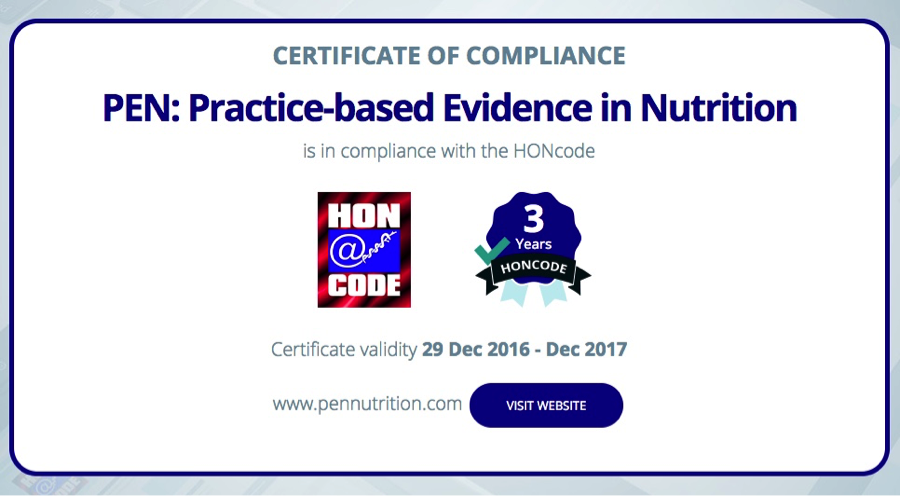
The PEN® website meets the eight principles set by HON to achieve certification:
- Authority: All medical information presented on your web site must be attributed to an author and his/her training in the field must be mentioned.
- The PEN® website identifies authors and reviewers with credentials noted within each Knowledge Pathway under Pathway Contributors. The PEN® content team and advisory committees are described at: Contributors
- Complementarity: A statement clearly declaring that the information on the website is not meant to replace the advice of a health professional has to be provided.
- The PEN® website clearly states that the information it contains “should be used to complement, not replace sound clinical judgment.“
- Confidentiality: Respect the privacy of site users
- See Privacy Policy sections of PEN license agreement (available on every PEN® page).
- Attribution: Cite the sources and dates of medical information
- All knowledge objects, e.g. questions, tools and resources, toolkits etc., in the PEN® System are date stamped with last updated date, which reflects date when review and or updating has occurred.
- All practice guidance in the PEN® website is referenced according to standardized procedures outlined in the PEN Writer’s Guide and PEN® Style Guide (PEN® access required).
- Justifiability: Justification of claims / balanced and objective claims
The PEN® System uses two approaches to grading the evidence. In 2015 the PEN® partners made the decision to adopt the GRADE approach to developing practice recommendations. This approach is best suited to Practice Questions that compare interventions. Going forward, GRADE is being used for new and updated Practice Questions that meet this criteria.
The strength of the recommendation and the quality of the evidence used to make the recommendation are both evaluated in the GRADE approach. Recommendations are evaluated to be either Strong or Weak and the quality of evidence is rated as high, moderate, low or very low.
Other types of Practice Questions, such as those pertaining to diagnosis or prognosis, will continue to be addressed using the PEN System evidence-based process. In these circumstances, key practice points are assigned an evidence grade by the Knowledge Pathway author using the PEN® grading protocol:
- Level A - the conclusion is supported by good evidence
- Level B- the conclusion is supported by fair evidence
- Level C - the conclusion is supported by limited evidence or expert opinion
- Level D - evidence is from limited studies that are either such poor quality or too conflicting that no conclusions can be made. No evidence from either authoritative sources or research involving humans was found.
See the PEN Authors and Reviewers Guide for a full description of the PEN® approach to retrieval, synthesis and grading of evidence, and for more information on the levels of evidence.
- Transparency: Accessibility, provide valid contact details
- The PEN® website is set to be available during core business hours (to support two Canadian Dietitian Contact Centres) and achieves this target 99.9% of the time. Maintenance (migrating changes to production) is scheduled once a month, on the last weekend of the month, to minimize user downtime and interruptions.
- Contact Us is available on every PEN® web page. Customer Service response times are monitored to ensure the target of 85% of contacts are addressed in less than 72 hours. PEN® Client Services consistently meet or exceed this target.
- Financial disclosure: Provide details of funding
- Funding
It is essential that the development of evidence-based tools for practice guidance be not biased through the influence of commercial entities that may stand to benefit from the service and its recommendations. As such, Dietitians of Canada does not accept corporate sponsorship for the production or updating of practice guidance provided in the knowledge pathway content of the PEN® System. DC does not host or receive funding from advertising or from the display of commercial content on the PEN® website. All PEN® authors and reviewers are required to complete a Declaration of Affiliations and Interests Form that is kept on file with Dietitians of Canada.
Funding for the PEN® database has been provided by professional associations, subscription and licensing revenues, government grants and health authorities. See: http://www.pennutrition.com/contributors.aspx
- Advertising: Clearly distinguish advertising from editorial content
- As above: DC does not accept corporate sponsorship for the production or updating of practice guidance provided in the knowledge pathway content of the PEN® system. DC does not host or receive funding from advertising or from the display of commercial content on the PEN® website. See About PEN
To learn more about the Health on the Net Foundation visit their website.
Please join the PEN® Global Team in spreading the news about our success in achieving the HONcode as a reliable and credible health and nutrition web site.
Written by Jayne Thirsk, RD, PhD, FDC
PEN® Director
Dietitians of Canada
Announcements from THE PEN® community
Just launched . . . new Dietitians Association of Australia website
The Dietitians Association of Australia has seen 2017 come in with a bang . . . launching their new website in January!
In addition to a new look and better layout, the functionality of the new website is much improved. A more efficient search function on the home page is a critical gateway to the rest of the content on the website. And for DAA members, a personal dashboard (a first - introduced with the new website) allows easy access to important news and announcements from DAA.
Smart Eating for a Healthier You, the nutrition hub for the public, has been revitalised. And the new website has a ‘Voice of DAA’ section – a one-stop-shop for updates on advocacy work, submissions and media releases. As a second phase addition, DAA will soon be launching a new ‘Marketplace’ section, which will allow DAA members to interact to sell their goods and services to each other and to the public.
DAA has already received positive feedback from members and stakeholders on the new website. Check it out at www.daa.asn.au
Enjoy a taste of Tasmania at the 34th DAA National Conference in Hobart
A gourmet farmer, innovative presentation styles, picturesque scenery . . . and much more. The DAA National Conference in Hobart, 18-20 May 2017 is not to be missed!
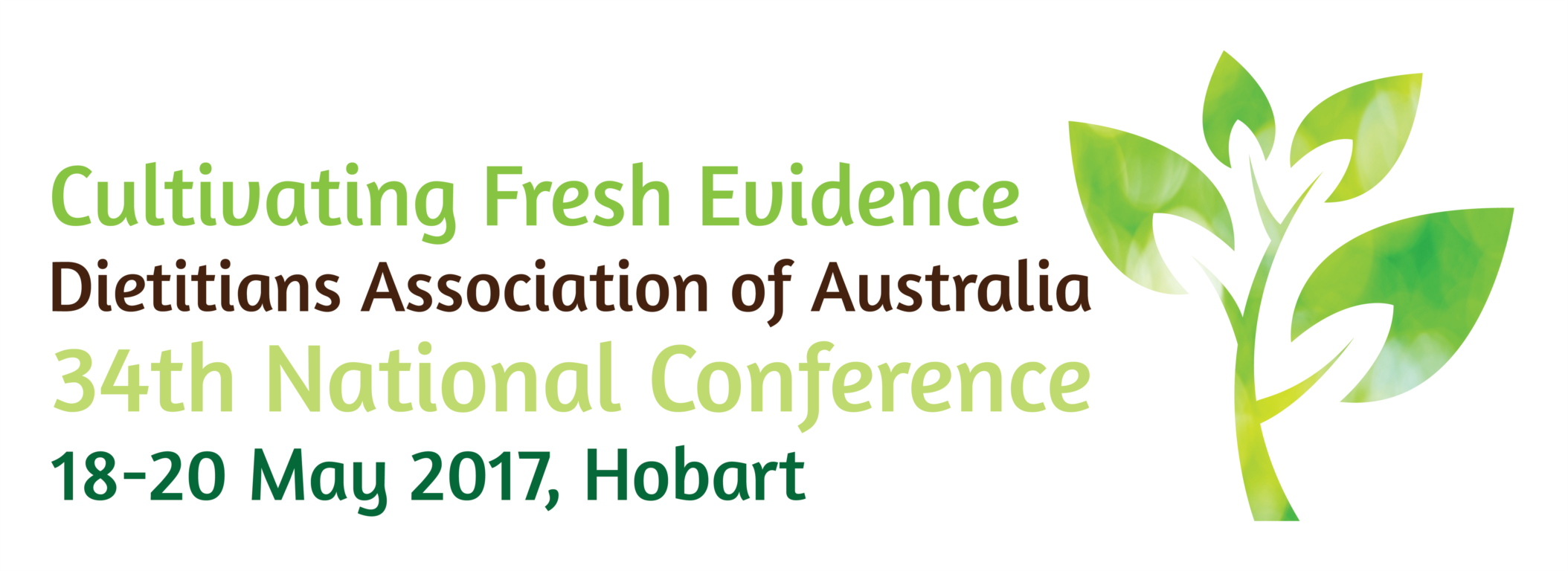
Registration for this year’s DAA National Conference has opened, and what an exciting program we have for delegates. Exploring the theme of Cultivating Fresh Evidence, three plenary themes – Nutrition Economics, Future Nutrition in Clinical Practice and Marketing and Nutrition Communication Debate – will showcase outstanding keynote speakers. Take a look at the program here.
We are thrilled to be hosting this year’s conference in Hobart, Tasmania. Hobart’s restaurants, markets and picturesque scenery provide a great backdrop for our Scientific and Social Program. To kick things off on Wednesday 17 May 2017, we’ll host a special event Tasting Tasmania, which will provide delegates with an opportunity to enjoy the delicious local produce that Tasmania is famous for. Attendees will hear from guest Matthew Evans, the Gourmet Farmer and a Tasmanian local.
The conference itself is full of interesting sessions. Presenting on Nutrition Economics, we will be joined by:
- Professor Do Thi Ngov Diep from Vietnam, whose community-based nutrition focus is on malnutrition, micro-nutrient deficiency, obesity and diabetes.
- Professor Amanda Lee, Chair of the National Health and Medical Research Council’s Dietary Guidelines Working Committee whose research focuses on prevention of chronic disease, Indigenous nutrition and food/nutrition policy.
- Professor Alan Shiell, Professor of Health Economics in the School of Psychology and Public Health at La Trobe University.
Sharing insights on Future Nutrition in Clinical Practice are Dr Jane Muir, whose researched has focused on understanding the role of dietary carbohydrates in the health of the gastrointestinal tract, and Professor Manny Noakes, who is considered a key opinion leader and trusted advisor in nutrition and health, particularly in the area of higher protein dietary patterns and weight management.
Dr Glenn Cardwell, AdvAPD will facilitate a Marketing and Nutrition Communication Debate with the following panelists:
- Professor Clare Collins, FDAA and Spokesperson for DAA
- Leon Compton, presenter with ABC Radio Hobart
- Maree Hall, Senior PR Dietitian at DAA
- Alan Taylor, Director of communications agency 303 MullenLowe
- Peter Choraziak, Director of creative agency Red Jelly.
Read more about all keynote speakers here.
For the first time delegates will be introduced to two new, innovative presentation styles: Tabletop conversations (or Speed Geeking) and PechaKucha (Japanese for chatter).
Download the conference app (coming soon) and hear media and social media updates on research presented. You can also join the conversation on social media using the hashtag #DAA2017.
If you’re able to join us in Hobart, register by Tuesday 21 March 2017 to take advantage of early-bird rates. We hope to see you in Tasmania!
More than Meets the Eye: DC National Conference 2017 educational program released
Join dietetic colleagues this June for four days of thought-provoking lectures, enlightening education sessions, hands-on workshops, instructive tours and research presentations that address the issues that impact your day-to-day practice! Plan to attend the DC National Conference, June 7-10 in scenic St. John’s Newfoundland and Labrador.
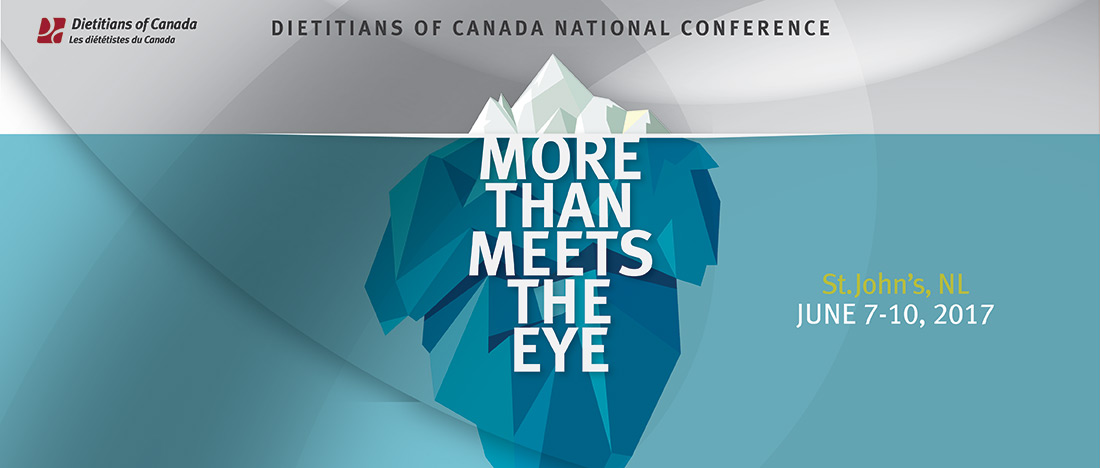
Find the full conference schedule, education program, speaker biographies and research presentation schedule in addition to our helpful conference attendance justification toolkit, travel and tourism information and a link to the quick and easy online registration at www.dietitians.ca/conference. Save 10% when registering by the early bird deadline on April 24.
And why not submit your research or practice experience findings? Canadian Foundation for Dietetic Research invites dietitians and students (including dietetic interns, undergraduate and graduate students in dietetics and nutrition) to submit abstracts by March 15. Find complete information and submit your abstract at www.cfdr.ca/sharing/conference.aspx.
LEARN MORE
PEN eNews
February 2017 Volume
6 (5)
A Publication of the PEN® System Global Partners,
a collaborative partnership between International Dietetic Associations.
Learn more about PEN.
Copyright Dietitians of Canada
. All Rights Reserved.